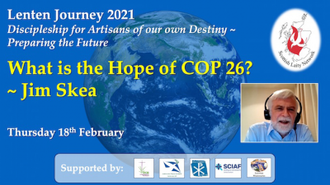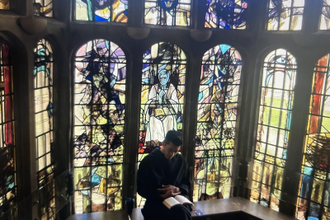What is the hope of COP26?

The Scottish Laity Network's Lenten Journey 2021 began with Professor Jim Skea sharing on 'What is the Hope of COP26?' on 18 February. Jim is an internationally-recognised climate scientist and the Co-chair of Working Group III of the Intergovernmental Panel on Climate Change (IPCC), leading their work on climate change mitigation. In September 2018, the Scottish Government appointed him Chair of the Scottish Government's 'Just Transition Commission'.
Jim began by acknowledging that the issue of Climate Change can lead to despair, especially in light of the challenge that's involved, but, linking into theme of the Lenten Journey, he felt that it was a tractable problem if we have the will to address it. Beginning at a very basic level, he identified the fundamental causes of Global Warming and affirmed that is now scientifically acknowledged that it is human-made carbon dioxide (CO2) emissions that have tipped the balance. He flagged up the need to recognise the long-term impact of CO2 that will remain in the atmosphere for hundreds of years and thus the need for urgency.
Jim gave a good overview of COP26, the UN climate conference scheduled for November 2021 in Glasgow, and gave a sense of magnitude of the event itself and the way it is structured. He also identified the key issue as 'fulfilling the hope! Participants also need to finish the 'Paris rulebook' and upping the ambition on national pledges in terms of emissions, finance and climate resilience.
The impact of the global warming rise of just 1°C is already being felt in various parts of the world especially in those areas that are heating up more rapidly. Any just response has to take into account this global impact. Currently we are on track, unless we take urgent action, to have a planet that is 3°C warmer by the end of the century. The Paris Agreement (adopted at COP21 December 2015 and entered into force on 4 November 2016) has its goal of limiting global warming to well below 2°C and preferably 1.5°C. However, whilst the Paris Agreement had an understanding of the impact of a 2°C rise, there was no real understanding of the impact of a rise of 1.5°C. The IPCC was invited to provide a report for them on the impacts of that rise and 'related global greenhouse gas emission pathways'.
Their report came out in 2018 and Jim highlighted that the IPCC felt it was really important to stress that it should be seen within the crucial context of "sustainable development and efforts to eradicate poverty". Jim shared a picture of possible pathways of CO2 emissions in the 21st century. It showed the pathways that have to be followed to limit global warming to 1.5°C and get to net zero CO2 globally by about 2050. Not every country needs to do it at the same time but that's where we need to get to globally. Another critical point is that we need to cut global carbon dioxide emissions by almost half over the next few years and, based on where we are at just now, that is extremely ambitious.
Regarding 'Where are we now?' and how that relates to our targets, Jim referenced the work being done by United Nations Environment Programme which annually produces a report that compares the long-term targets of the IPCC with the various government policy pledges on climate change. However, the current pledges are insufficient and stepping them up is very much part of the agenda for COP26.
To limit warming to 1.5°C will require "rapid, far-reaching and unprecedented changes in all systems"'. Jim identified some examples of areas that had to be addressed. All the pathways that limit global warming to 1.5°C involve CO2 removal and Jim identified the main methods for doing this. On the issue of 'what we can do' in our own life, the two biggest impacts are what we eat and flying. We also need to look at the energy efficiency of our homes and our personal travel decisions. In response to the question of 'why can't we just plant more trees' there had to be recognition of the current use of the land where it was proposed to plant new trees and the possible impact on livelihoods of those currently living on that land.
Climate Change in Scotland
With the devolved powers Scotland has a separate Scottish Climate Act that has a net zero target by 2045 and that includes planes and shipping. To achieve that target there is a Climate Change Plan and a Just Transition Commission that "ensures the benefits of climate change action are shared widely, while the costs do not unfairly burden those least able to pay, or whose livelihoods are directly or indirectly at risk as the economy shifts and changes."
However, beyond the targets and plans there is the need to get the whole community onboard and that is the aim of 'Scotland's Climate Assembly' which aims to bring together 'ordinary' people from across Scotland to talk about the climate agenda and discuss priorities. The Just Transition Commission has also been traveling round the country to get a sense of the concerns of those who will be impacted most in the transition process. In response to the COVID crisis they were charged with looking at the ways the pandemic had impacted the aim to carry forward the climate change agenda in a fair and just manner. Their Green Recovery report highlighted particular 'hot spots' that had to be addressed and gave recommendations for positively taking forward the Climate Change agenda.
You can watch the recording at: https://youtu.be/fet3gzwDMoI
Next session on Thursday 25 February: 'What is Pope Francis and the COVD-19 Commission saying and doing that gives us Hope?' Speaker: Lorna Gold
Register by emailing: slaitynetwork@gmail.com
See the whole Lenten Programme at: www.indcatholicnews.com/news/41314


















